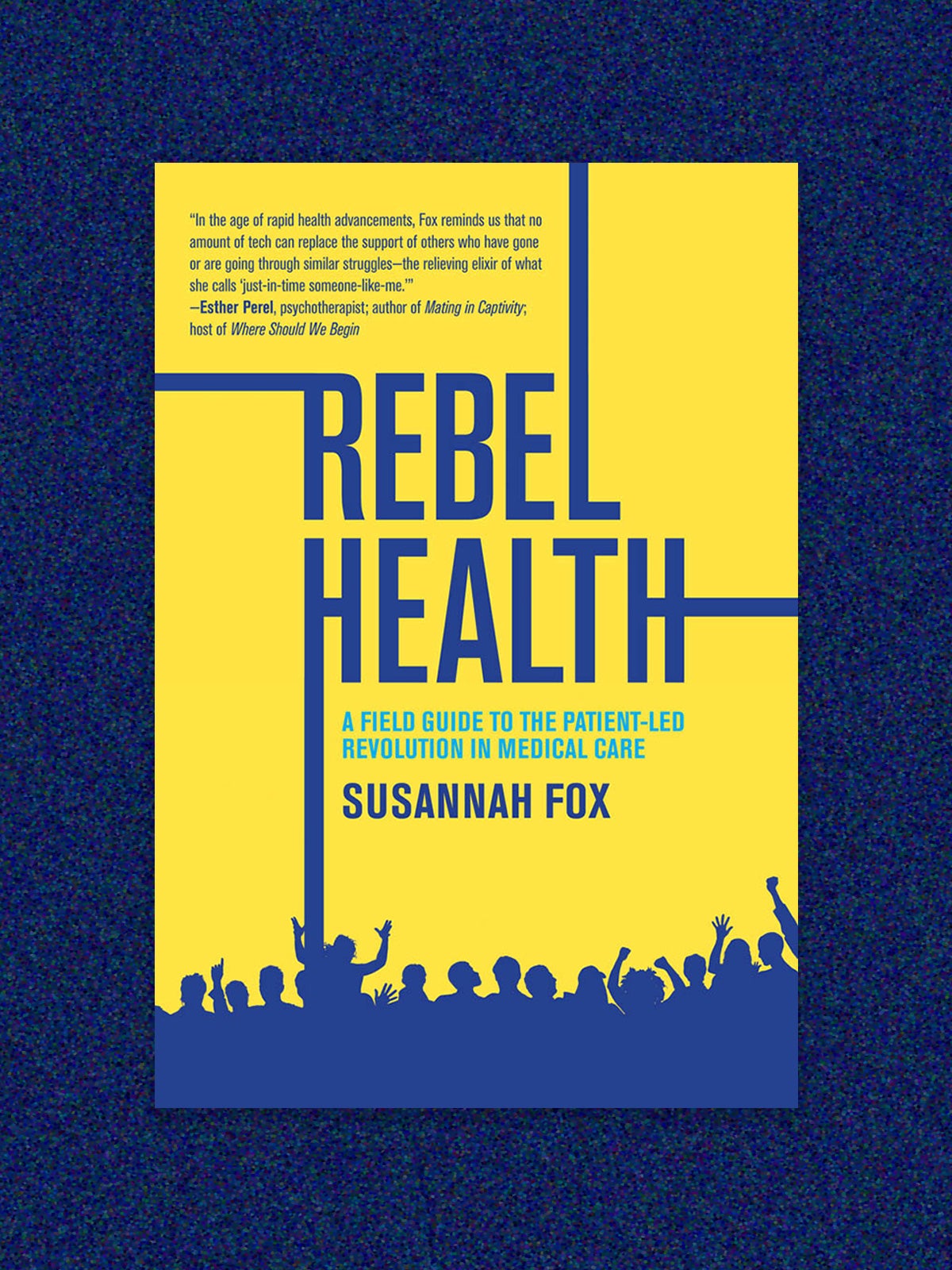
Book
The patient-led care revolution
Susannah Fox, former chief technology officer at the U.S. Department of Health and Human Services, has emerged as one of the nation’s most prominent advocates for patient-centered health care. Her new book, Rebel Health: A Field Guide to the Patient-Led Revolution in Medical Care, is built on a decades-long career at the intersection of technology and health. Her central thesis is this: Leaders in health care must invest in patient-led research and advocacy. Patient perspectives, Fox argues, are critical to the health field’s ability to innovate.
Fox’s book is concise—it could be read on a cross-country flight—but offers a comprehensive guide to creating, supporting, and learning from patient communities that have sprung up online and in-person (think long COVID groups). Rebel Health seeks to empower patient leaders and calls on health care workers to join the growing movement supporting patient-led health care.
Fox spoke with Fiona Lowenstein, independent journalist, co-founder of Body Politic’s Long COVID support group, and editor of The Long COVID Survival Guide. The interview has been condensed and edited.
HPH: How do you feel your previous work prepared you to write this book?
Fox: As a researcher, I got to spend time in communities of people living with rare and life-changing diseases. In the 1990s, I had the opportunity to work for internet start-up companies and help build websites. I was really attracted to the idea that we could flip the power hierarchy so people had access to information. When I started looking at health care, I realized the potential again for flipping the power hierarchy so that patients, caregivers, and survivors [not only] have access to information but can also actually contribute to science.
Sign up for Harvard Public Health
Delivered to your inbox weekly.
HPH: Rebel Health describes how medical professionals once saw the internet as an opportunity to educate but not to listen. In 2001, the American Medical Association warned patients away from chat rooms because it believed untrained individuals sharing medical information was dangerous. To what extent have these attitudes changed?
Fox: Things have progressed to some degree since the early 2000s. A mentor told me that there was actually a hand signal that doctors would use to communicate to each other that a patient was an internet user. A patient who arrived with stacks of printouts from online research was seen as someone who was going to suck up a doctor’s time with their questions and wild theories. Clinicians are now more likely to see the benefit of patients who research their conditions and treatment choices online. People who stay informed, whether by reading journal articles or talking with other patients, can often engage in a higher-level conversation when they meet with a clinician. They can skip the introductory material and get to disease management. We’ve moved toward patient engagement. But I argue in the book that we need to move toward patient-led health care.
HPH: What is the difference?
Fox: The term “patient-centered” was created to describe a departure from physician-centered health care, the default setting. The old model assumed that patients would want a doctor to direct their care from start to finish, no questions asked. The new model invites a patient to engage in their care, to ask questions, to be at the center of a team of people who are looking out for them.
I have seen the shift to patient-led health care happen most radically when there are no clinicians around, whether because the people suffering are not yet visible to the mainstream health care system, as in the case of an emerging disease or a set of mysterious symptoms, or because the people in need are shut out of care because of discrimination, geography, economics, and other factors.
HPH: What is the risk of misinformation in patient-led groups?
Fox: Misinformation and disinformation is a significant risk. I think we have the opportunity to educate the people [organizing patient groups] and train them in fact-checking. Studies have found that…a healthy online community will swarm misinformation like it’s a virus [and] delete it. You have to join a community that really values science, though. That’s where people with influence can help.
For example, communities [that are] sponsored by the Mayo Clinic have paid moderators. Any institution that believes in public health could host a community or find a community that’s doing a great job and support them—for example, by making sure that there are moderators on call 24/7, paying moderators to do the incredible public health work that they’re doing, [providing] training, or taking away the headache of any technology glitches. There are a lot of ways that people with influence and resources could help lift up these conversations, and that’s a path that I really, really hope the book will shine a light on.
HPH: Your book focuses a lot on the digital age, but “rebel health” predates the internet, right?
Fox: There have been people who were collecting data [on marginalized conditions] for a long time. The Black Panther Party [was collecting data on] sickle cell disease way before [patients] started collecting data to prove that long COVID existed. In the 1920s, the Black Cross nurses [provided] medical training and nutrition counseling in the Black community. In the 1930s, Alcoholics Anonymous was a radical health movement to help people recover from alcohol use disorder. In the 1950s, La Leche League helped people to understand the benefits of breastfeeding. People who were not being well served in the mainstream system turned to each other, innovated, and eventually saw their innovation move into mainstream practice. We all benefit from those innovations.
HPH: So much of your book focuses on people and systems that often appear invisible. Why do health care leaders need to pay attention to these issues?
Fox: Often when I talk about the patient-led revolution, people immediately say, “you’re talking about support groups.” The incredible emotional support that comes from feeling like there are other people like you [is] very important…but that is just one aspect. There’s so much more that people can benefit from. People who share the same disease, life stage, or disability can share recommendations about everything from clinical trials to practical tips for daily life. For example, many conditions require people to self-inject medication. A clinician may demonstrate how to do it, but once a patient is home they are on their own. Peers are always available to fill in the gaps, no appointment or office hours required. There are tons of online videos and blog posts about how to assemble your supplies, fill a syringe, psych yourself up, and minimize pain. In the next 10 years, it’s going to be a competitive advantage to understand the patient-led revolution. You’re going to want to have health rebels on your health care team.
Book cover: MIT PRESS


